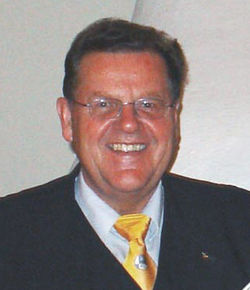Salzburg (pps/December 17, 2009) For the fist time at the 41st FIL Luge World Championships in Lake Placid six nations earned at least one medal. This is why FIL President Josef Fendt described this incident as "a very pleasant mix of medals from an international point of view". And bearing in mind the medal victories of Germany, Austria, Italy, Latvia, the Ukraine and the US, Fendt added: "This clearly shows that the sport of luge is widely spread around the globe".
The number of member federations also underlines this fact: 53 national member federations from four continents are affiliated with the FIL. The "youngest" member nations are Turkey, Tonga and Kazakhstan. "And I will continue my efforts to integrate the fifth continent, Africa, within the FIL so as to help invigorate the fifth Olympic ring", promised FIL President Josef Fendt on the occasion of the 57th FIL Congress in Liberec, Czech Republic.
Another ambitious aim of the FIL is to have the team relay event included within the Olympic programme. "We hope to achieve our goal so that this discipline will be included at the 2014 Olympic Winter Games in Sochi", explained Fendt, already in his 15th year as President of the International Luge Federation. "We've already had preliminary talks in this respect and have filed the appropriate motion with the International Olympic Committee within the time limit".
The International Luge Federation still aims to have the discipline "natural track luge" included within the Olympic Programme of the International Olympic Committee, IOC. "We will stick to our plans - and we think they are quite realistic - to file a new motion with the IOC for the 2018 Winter Games. We know that there's still a lot of work to be done in the upcoming years," explained Fendt.
The luge on artificially-iced tracks, however, is an inherent part of the Olympic Programme and has even been named an Olympic "key sports" by the IOC. Fendt: "This clearly shows that we do not have any nominal members within our federation". And the FIL meets another IOC criteria, that of a doping-free sports. "Despite numerous anti-doping tests carried out by the International Anti-Doping Agency, WADA, national anti-doping controls, controls during luge events and many controls by our federation we have not found a single positive result with any of our international lugers", Fendt disclosed with no little bit of pride. At the XXI Olympic Winter Games in Vancouver (February 12-28, 2010) blood doping controls will be carried out for the first time in luge. Josef Fendt: "And I really hope that the sport of luge will continue to boast a clean slate after the Olympic Games".
Another exemplary feature within the FIL is the support of the so-called "small nations". The Olympic solidarity enjoys a great importance in the sport of luge. With an enormous financial expenditure the international federation supports "small" federations and even provides coaches free of charge. By the way, the FIL "Solidarity Programme" has already well proven its worth - well established luge nations such as Germany, Austria or Italy thus accommodate smaller federations in their training sessions.









